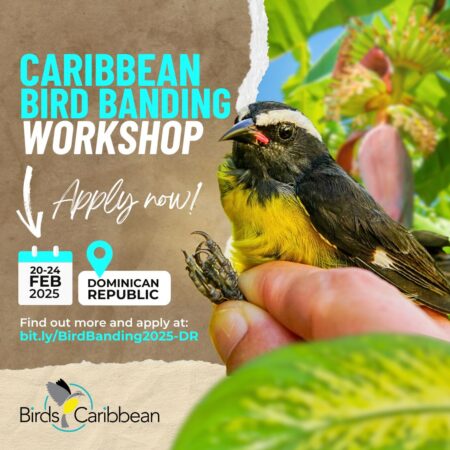 If you like Caribbean birds, maybe you want to learn to put a ring (or band) on them!
If you like Caribbean birds, maybe you want to learn to put a ring (or band) on them!
BirdsCaribbean is excited to invite applications to participate in a 5-day training workshop focused on bird banding, an important tool for research and monitoring! Participants will learn about the basics of bird banding, from setting up a mist-net to examining molt patterns, through a blend of classroom and field based activities. We’ll also discuss and demonstrate some of the benefits of joining our new Caribbean Bird Banding Network. We’re very excited to return to the Dominican Republic to one of our favorite workshop sites, Baiguate Ecolodge in Jarabacoa. Mark your calendars — this year’s workshop will take place from 20-24 February, 2025.
Why do we need to band birds?
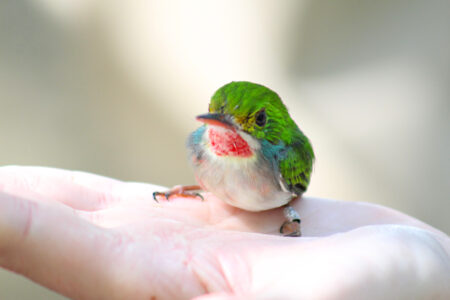
Bird surveys, like those covered in our Caribbean Landbird Monitoring Training Workshops, provide valuable information about abundance and species presence. But bird banding is a different methodology that takes a deeper dive into how bird populations are doing by assessing the condition of individual birds. By marking and assessing birds in the hand, we can collect data that can tell us about their demography and health, including:
- Looking at fat scores and weights to assess the body condition of birds in different habitats and at different times of the year, which in turn sheds light on the quality of the habitats these birds are using.
- Aging birds using plumage to investigate demographic patterns.
- Using recapture records to learn about survivorship and longevity.
- Assessing the presence or absence of breeding characteristics to better understand the timing of breeding and life history for many of our understudied Caribbean endemics.
- Finding out which migratory routes our shared birds are taking and gaining a better understanding of factors influencing survival and longevity of species.
Over the long-term, bird banding data can also help us understand patterns and trends in bird populations, to aid in their management and conservation.
About the workshop
This workshop is the fourth annual Caribbean Bird Banding (CBB) Training Workshop. It will cover many of the same topics explored in our previous CBB Training workshops held in The Bahamas (March 2022) and the Dominican Republic (March 2023) and Grenada (March 2024). This bilingual (English and Spanish) workshop is designed for Caribbean wildlife professionals and volunteers who are interested in gaining more experience with bird banding. Prior banding experience is not required. However, priority will be given to applicants who are likely to continue training to gain the knowledge, skills, and experience needed to contribute to or initiate avian research and/or banding programs on their home islands. This workshop will focus on banding landbirds, with an emphasis on Passerines. We hope to provide banding training opportunities for other bird groups in the future.
The purpose of the workshop is to:
- Provide participants with a basic understanding of bird banding techniques and best practices.
- Discuss what it takes to set-up and run a bird banding station.
- Prepare participants for additional bird banding training and potential North American Banding Council (NABC) certifications (assistant, bander, trainer) in the future.
- Share information about the other training opportunities, resources, and community available through the CBB Network.
Several NABC-certified trainers will share their knowledge in the classroom, at the mist-net, and at the banding table, covering topics including:
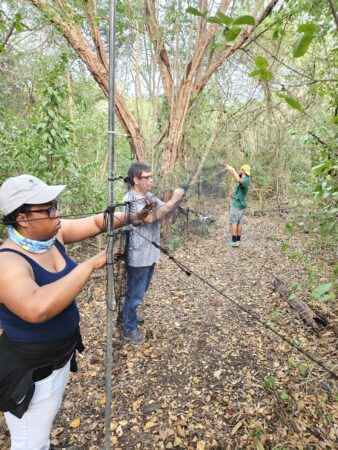
- Proper set-up and placement of a mist-net
- Proper techniques for extracting birds from mist-nets
- Starting a banding station
- Bird first-aid and safety
- Bird banding ethics and basics
- Using bird banding for education and public demonstrations
- Aging birds using both WRP and Howell-Pyle terminology
- Molt patterns
Bird banding is a complex skill to learn. This workshop is intended to be a starting point, and participants should not expect to leave the workshop with the necessary qualifications to band birds independently. To become fully immersed and practice what was learned at the workshop, participants will have the opportunity to be considered for bird banding internships following the workshop.
In an effort to decrease the amount of time spent in the classroom, some materials will be shared virtually prior to the in-person workshop. These virtual sessions will also be made available to a wider audience. Stay tuned for more information!
Funding and Logistics
We aim to include approximately 15 participants in this workshop. BirdsCaribbean has funding for a limited number of need and merit-based scholarships to cover the costs of travel and participation. Participants who are able to contribute all or part of their costs can allow us to include additional participants. We encourage applications from all candidates who are well-suited to make use of this training, regardless of their financial ability. Participants should plan to arrive in the Dominican Republic by February 18 and depart on February 25.
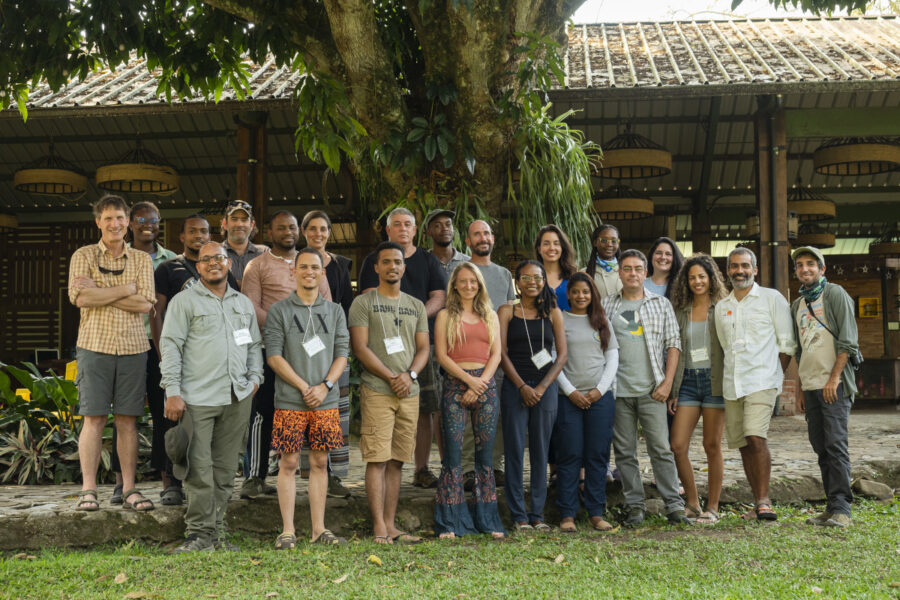
Applications
If you are interested in participating in this workshop, please fill out this form by 8 December 2024.
English Version: bit.ly/CBB-2025-Application-ENG
Versión en Español: https://bit.ly/CBB2025-Solicitud-ESP
If you have any questions, please send an email to:
Maya Wilson, Landbird Monitoring Program Manager: Maya.Wilson@BirdsCaribbean.org
Holly Garrod, Caribbean Bird Banding Coordinator: Holly.Garrod@BirdsCaribbean.org
Oportunidad de formación: Taller de anillamiento de aves caribeñas
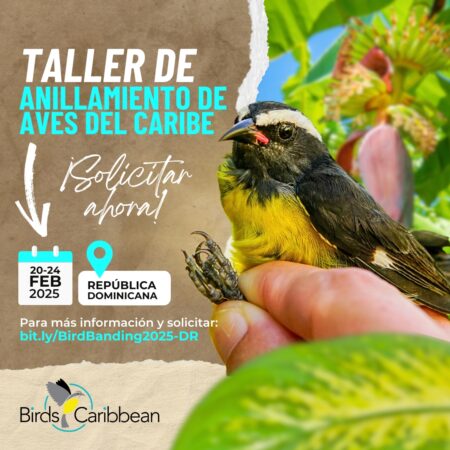 Si te gustan las aves del Caribe, ¡Quizás quieras aprender a ponerles un anillo (o una anilla)! BirdsCaribbean se complace en invitarte a participar en un taller de formación de 5 días centrado en el anillamiento de aves, ¡Una importante herramienta para la investigación y el monitoreo! Los participantes aprenderán los fundamentos del anillamiento de aves, desde la instalación de una red de niebla hasta la revisión de los patrones de muda, a través de una mezcla de actividades en el aula y sobre el terreno. También discutiremos y demostraremos algunos de los beneficios de unirse a nuestra nueva Red de Anillamiento de Aves del Caribe. Estamos muy contentos de volver a República Dominicana, a uno de nuestros lugares favoritos para los talleres: Baiguate Ecolodge, en Jarabacoa. Márcalo en tu calendario: el taller de este año tendrá lugar del 20 al 24 de febrero de 2025.
Si te gustan las aves del Caribe, ¡Quizás quieras aprender a ponerles un anillo (o una anilla)! BirdsCaribbean se complace en invitarte a participar en un taller de formación de 5 días centrado en el anillamiento de aves, ¡Una importante herramienta para la investigación y el monitoreo! Los participantes aprenderán los fundamentos del anillamiento de aves, desde la instalación de una red de niebla hasta la revisión de los patrones de muda, a través de una mezcla de actividades en el aula y sobre el terreno. También discutiremos y demostraremos algunos de los beneficios de unirse a nuestra nueva Red de Anillamiento de Aves del Caribe. Estamos muy contentos de volver a República Dominicana, a uno de nuestros lugares favoritos para los talleres: Baiguate Ecolodge, en Jarabacoa. Márcalo en tu calendario: el taller de este año tendrá lugar del 20 al 24 de febrero de 2025.
¿Por qué necesitamos anillar aves?
Los censos de aves, como los que se tratan en nuestros Talleres de Formación para el Monitoreo de Aves Terrestres del Caribe, proporcionan información valiosa sobre la abundancia y la presencia de especies. Pero el anillamiento de aves es una metodología diferente que profundiza en la situación de las poblaciones de aves mediante la evaluación del estado de cada individuo. Marcando y estudiando a las aves en la mano, podemos recopilar datos que nos informen sobre su demografía y salud, entre otros:
- Observar la acumulación de grasa y el peso para evaluar la condición corporal de las aves en diferentes hábitats y en diferentes épocas del año, lo que a su vez arroja luz sobre la calidad de los hábitats que estas aves están utilizando.
- Determinación de la edad de las aves mediante el plumaje para investigar patrones demográficos.
- Utilizar los registros de recapturas para conocer la supervivencia y la longevidad.
- Evaluar la presencia o ausencia de características reproductivas para comprender mejor el momento de la reproducción y el ciclo biológico de muchas de nuestras poco estudiadas endémicas caribeñas.
- Averiguar cuáles rutas migratorias siguen nuestras aves compartidas y comprender mejor los factores que influyen en la supervivencia y longevidad de las especies.
A largo plazo, los datos provenientes del anillamiento también pueden ayudarnos a comprender los patrones y tendencias de las poblaciones de aves, para contribuir a su gestión y conservación.
Sobre el taller
Este taller es el cuarto taller anual de formación sobre anillamiento de aves en el Caribe (CBB). Cubrirá muchos de los temas ya explorados en nuestros talleres anteriores de capacitación sobre la CBBN celebrados en Bahamas (marzo de 2022), República Dominicana (marzo de 2023) y Granada (marzo de 2024). El taller bilingüe (inglés y español) está diseñado para profesionales y voluntarios que trabajan con vida silvestre en el Caribe y que estén interesados en adquirir más experiencia en el anillamiento de aves. No se requiere experiencia previa en anillamiento. Sin embargo, se dará prioridad a los solicitantes que tengan posibilidades de seguir formándose para adquirir los conocimientos, habilidades y experiencia necesarios para contribuir o iniciar programas de investigación y/o anillamiento de aves en sus islas de origen. Este taller se centrará en el anillamiento de aves terrestres, con énfasis en los paseriformes. Esperamos ofrecer oportunidades de formación en anillamiento para otros grupos de aves en el futuro.
Los objetivos del taller son:
- Proporcionar a los participantes una comprensión básica de las técnicas de anillamiento de aves y las mejores prácticas.
- Discutir lo que se necesita para montar y dirigir una estación de anillamiento de aves.
- Preparar a los participantes para formación adicional en anillamiento de aves y posibles certificaciones del Consejo Norteamericano de Anillamiento (NABC) (asistente, anillador, entrenador) en el futuro.
- Compartir información sobre otras oportunidades de formación, recursos y comunidades disponibles a través de la Red CBB.
Varios formadores certificados por el NABC compartirán sus conocimientos en el aula, en las redes de niebla y en la mesa de anillamiento, cubriendo temas como:
- Montaje y colocación adecuados de una red de niebla
- Técnicas adecuadas para extraer aves de las redes de niebla
- Puesta en marcha de una estación de anillamiento
- Primeros auxilios y seguridad
- Ética y fundamentos del anillamiento de aves
- Uso del anillamiento de aves para educación y demostraciones públicas
- Determinación de la edad de las aves utilizando terminología WRP y Howell-Pyle
- Patrones de muda
El anillamiento de aves es una habilidad compleja de aprender. Este taller pretende ser un punto de partida, y los participantes no deben esperar salir del taller con las calificaciones necesarias para anillar aves de forma independiente. Para sumergirse completamente y practicar lo aprendido en el taller, los participantes tendrán la oportunidad de ser considerados para prácticas o pasantías de anillamiento de aves tras el taller.
En un esfuerzo por reducir la cantidad de tiempo que se pasa en el aula, algunos materiales se compartirán virtualmente antes del taller presencial. Estas sesiones virtuales también se pondrán a disposición de un público más amplio. Mantente atento para más información.
Financiación y logística
Nuestro objetivo es contar con aproximadamente 15 participantes en este taller. BirdsCaribbean cuenta con financiación para un número limitado de becas basadas en la necesidad y el mérito para cubrir los costes de viaje y participación. Los participantes que puedan contribuir con la totalidad o parte de sus costes pueden permitirnos incluir participantes adicionales. Animamos a presentar solicitudes a todos los candidatos que reúnan las condiciones necesarias para aprovechar esta formación, independientemente de su capacidad financiera. Los participantes deben planificar su llegada a la República Dominicana para el 18 de febrero y su salida para el 25 de febrero.
Solicitudes
Si estás interesado en participar en este taller, llena este formulario antes del 8 de diciembre de 2024.
Versión en Español: https://bit.ly/CBB2025-Solicitud-ESP
Si tiene alguna pregunta, por favor envíe un correo electrónico a:
Maya Wilson, Gerente del Programa de Monitoreo de Aves Terrestres: Maya.Wilson@BirdsCaribbean.org
Holly Garrod, Coordinadora de Anillamiento de Aves del Caribe: Holly.Garrod@BirdsCaribbean.org


